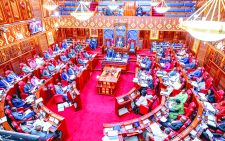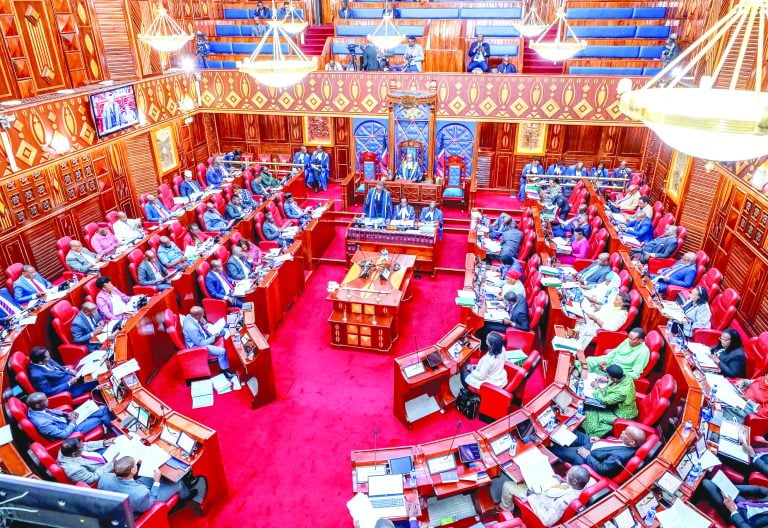New laws set stage for health sector changes

The health sector is from tomorrow set to undergo drastic changes once President William Ruto unveils the four Universal Health Coverage laws that are expected to guide the sector.
The President is set to unveil the programme during the Mashujaa Day celebrations to be celebrated in Kericho and whose them will focus on transforming health services.
Once they come into force after the President signs them, the laws will provide guidelines on how hospitals will deal with chronic illnesses. They will also provide a framework on how to ensure accountability in the payment for services from public funds.
President Ruto is tonight scheduled to return from China where he was attending the third Belt and Road Forum for International Cooperation. Among the things he is set to do once he arrives is to assent to the Primary Health Care Bill, Facility Improvement Financing Bill, Digital Health Bill and the Social Health Insurance Bill, all of which have been passed by the National Assembly and the Senate.
Root out cartels
The laws will subsequently be launched during tomorrow’s Mashujaa Day celebrations. On Tuesday, the National Assembly debated and passed the Facilities Improvement Financing and the Primary Health Care Bill that originated from the Senate. And last week, senators approved the Digital Health and the Social Health Insurance Bill.
National Assembly Leader of Majority Kimani Ichung’wah said the Bills will revolutionise the delivery of healthcare in the country and root out cartels that have diverted funds meant for healthcare services.
He said: “The Social Health Insurance Bill seeks to accelerate the progress we have made and fast track the achievement of UHC. NHIF was plagued by inefficiencies and governance challenges. It has also turned out to be financially unsustainable.”
Health Cabinet Secretary Susan Nakhumicha said the four Bills had been agreed on at Cabinet level. “We formulated the four Bills which have gone through both Houses of Parliament with the National Assembly endorsing two Bills on Tuesday morning. The President will assent to the four Bills by Thursday,” she said during the ongoing UHC conference at Kapkatet Stadium.
Using the new laws, the government intends to revamp the healthcare delivery system with the setting up of a Social Health Authority and Social Health Insurance scheme. The authority will be expected to finance primary level healthcare with the Social Health Insurance on-boarding beneficiaries.
The premiums will be capped at 2.75 percent of household earnings with the maximum being Sh5,000 per contributor.
According to Nakhumicha, while the Constitution provides that every Kenyan has a right to emergency healthcare, it does not specify mechanisms on how this should be realised, a challenge she says the government is working to address through the creation of the chronic illness fund.
The Social Health Insurance Bill seeks to provide for the setting up of the Primary Healthcare Fund and the Social Health Authority (SHA), which will replace the National Health Insurance Fund (NHIF).
Ironically, a new NHIF Chief Executive was picked last week and it is not yet clear how long he will remain in office before the fund is disbanded and whether he will automatically transition to the proposed authority.
The Bill also proposes to establish within the authority a Claims Management Office, which shall review and process all claims lodged by patients or hospitals. According to the Bill, the Authority will only make payments to a contracted healthcare provider or healthcare institution upon submission of a claim by the Claims Management Office.
It says the claims Office will be responsible for reviewing, processing and validating medical claims from healthcare providers and healthcare facilities, appraising medical claims based on various benefit packages, issuing pre-authorisations for access to healthcare services based on the benefit package as well as developing an e-claims management system.
Accountability
Reads the Bill in part: “The Claims Management Office shall delegate the performance of its functions to a suitable entity. The entity referred to shall be a medical insurance provider or a broker licensed by the Insurance Regulatory Authority under the Insurance Act: Provided that not more than five entities shall be contracted to manage the claims from the zones identified in the manner prescribed in the Regulations.”
And to further ensure transparency and accountability when dealing with patients and hospitals, the Bill proposes the digitisation of all processes and services using appropriate, reliable, secure, inter-operable, verifiable and responsive technology. The processes and services to be digitised include registration of members, member identification, contributions to the fund, inclusion of facilities, claims management and settlement of claims.
“Every Kenyan shall be uniquely identified for purposes of provision of health services. The digitisation of processes and services under this Act shall conform to the provisions of the Data Protection Act, 2019 and all other relevant laws,” the Bill stipulates.
With regards to Chronic and Critical Illness and Emergency, it recommends the formation of a fund to defray the costs of management of chronic illnesses after depletion of a member’s social health insurance cover. The fund will also cover the costs of emergency treatment.
According to the Bill, the sources of funds for the Chronic and Critical Illness and Emergency Fund will comprise of monies appropriated by the National Assembly, gifts, grants, donations or endowments; and revenue from any other lawful source. “The Cabinet Secretary may make regulations for the implementation of the Chronic and Critical Illness and Emergency Fund,” reads the Bill.
With regards to a health care provider or healthcare facility seeking to be enjoined into the programme, the Bill states that candidates will be required to make an application to the body responsible for accreditation.
On the other hand, the Primary Health Care Bill, 2023, roots for provision of primary health care at community level – with the help of community health workers.
In the Bill, the government seeks to hire 100,000 community health promoters whose roles shall include health education and promotion, disease prevention and control and family health services.
The Digital Health Bill, 2023 on the other hand seeks to provide a framework for provision of digital health services.
It seeks to develop guidelines for the safe handling and disposal of all health sector related e-waste material as well as provide measures to safeguard the transfer of a client’s medical records to and from facilities outside Kenya
“The Bill seeks to provide for a framework for provision of digital health services; to establish a comprehensive integrated digital health information system, data governance and protection of personal health information, service delivery through digital health interventions, e-waste disposal, health tourism,” it says.








